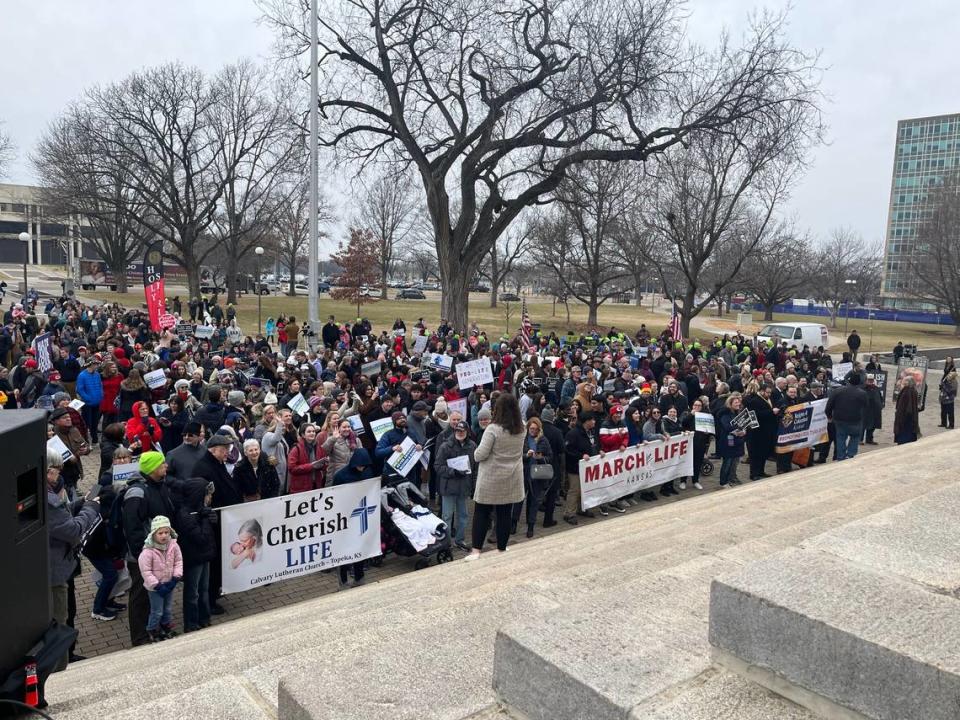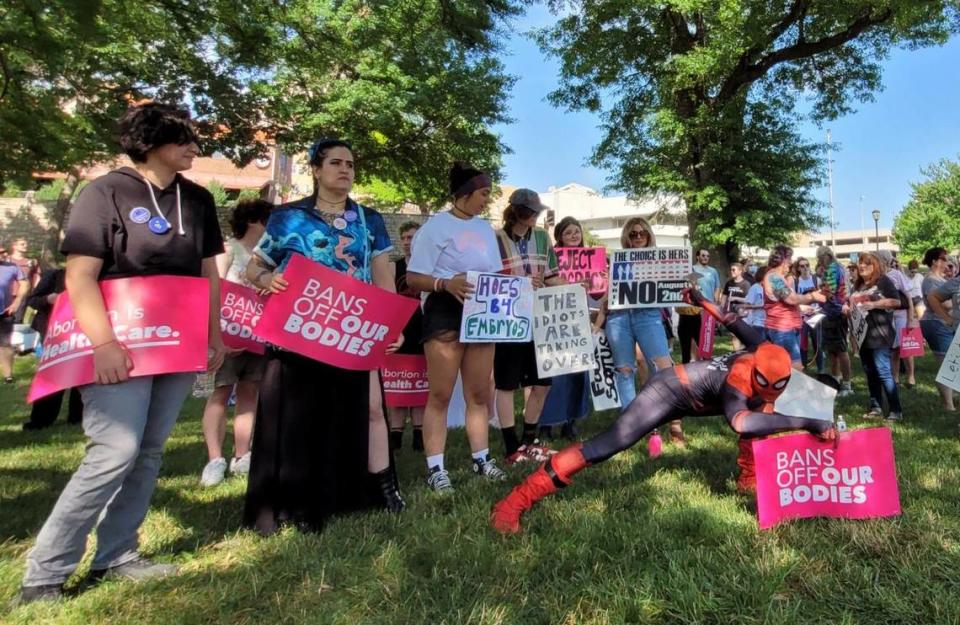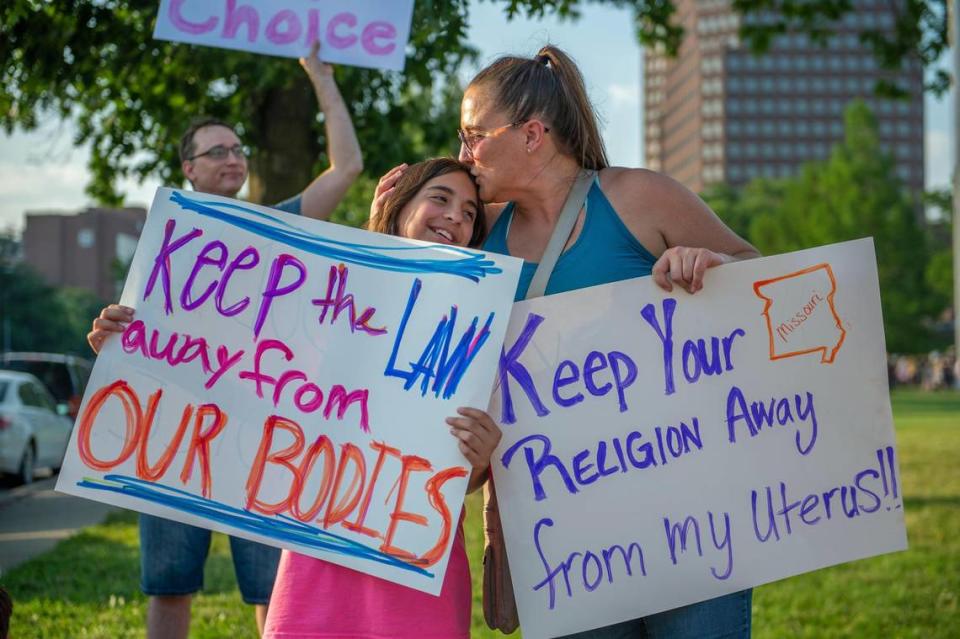KS lawmakers want to criminalize coercing someone into abortion. Some aim to go further
When Rebecca Schmoe found out she was pregnant, she was in disbelief. For years, doctors had told her she would be unable to conceive and she had previously suffered a miscarriage.
But when Schmoe, who is now a Kansas state representative, went to see her doctor to check on her unborn child, she was met with what she described as an hour-long onslaught of gruesome, bloody details about her certain death should she choose to carry the child to term.
She said her doctor, who practiced near Olathe, relentlessly insulted and pressured her into setting an appointment to abort her child, and would not let her leave his office until she did so.
In fact, the doctor was so certain that she would die that he did not allow her to listen to the heartbeat, and said she should pick out her casket and what kind of flowers she would prefer at her funeral.
“I was told I was selfish because my parents were going to have to bury me,” Schmoe said. “He told me that no parent deserves to bury their child.”
Schmoe got a second opinion, learned she had a high risk pregnancy and gave birth to a healthy child who is now 21 years old.
The Ottawa Republican is now a lead advocate of legislation to criminalize behavior to coerce a pregnant person to obtain an abortion.
“I am not asking anyone to give up what they feel about life,” she said. “Just to understand that coercion, regardless of the situation, is wrong.”
The bill – which she introduced on behalf of Kansans for Life, the state’s leading anti-abortion group – makes it a felony to coerce any pregnant person to obtain an abortion. It defines coercion as threatening someone’s physical or financial well being, threatening to attack someone in the legal system, tampering with someone’s legal documents or controlling access to medications.
Abortion has long been a hotly debated topic in Kansas. In 1991 Wichita made national headlines during a summer of intense anti-abortion protests outside a clinic that would provide abortions in the third trimester. In 2022 Kansas voters were the first in the nation to vote on abortion following the fall of federal abortion protections in Roe v. Wade – overwhelmingly supporting state abortion rights.

Support and opposition for legislation on abortion has often fallen along party lines in Kansas; the coercion bill has rare bipartisan support.
“I’m as pro choice as they come and even I think that’s wrong,” Rep. Stephanie Clayton, an Overland Park Democrat, said while discussing the bill.
But GOP skepticism to an effort from Democrats to broaden the policy to encompass other forms of reproductive coercion threatens to tank the bill.
“There’s just many ways that this type of violence can occur and I think if we’re gonna really truly work on something like this it should capture all those protections for women and families,” said Rep. Jo Ella Hoye, a Lenexa Democrat who amended the bill to ban many forms of reproductive coercion.
But the changes brought steep opposition. Jeanne Gawdun, a lobbyist for Kansans for LIfe, noted that public testimony was never taken on Hoye’s amendment, though lawmakers frequently make major changes to bills without public hearings.
“The timing of Rep. Hoye’s amendment seems to disregard women who have experienced coerced abortions by attempting to derail the original bill with language no one had a chance to examine,” Gawdun said. “If she and other proponents of her measure were serious, they would have introduced the measure through the regular process and allowed for public input.”

Forms of coercion
The bill itself gained broad support from traditionally anti-abortion groups alongside organizations that work to help survivors of sex trafficking.
“For those who believe that abortion should be a woman’s choice I ask you to join us in support,” Jeanne Gawdun, a lobbyist for Kansans for Life, said during a hearing on the bill last week.
Terry Hund, with the Project to Restore sex trafficking recovery program, told lawmakers about women she had worked with who were forced to have abortions by the people who were trafficking them.
But the state’s leading domestic violence prevention group said it did not go far enough, urging the Legislature to consider the other ways a woman can be coerced to have or not have a child.
Generally, reproductive coercion is considered any action to interfere with a woman’s choice of whether to be pregnant and use of contraceptives. That includes efforts to force a person to have an abortion but it also includes forcing someone to or not to use contraceptives, intentionally exposing a partner to sexually transmitted infections or forcing someone to become pregnant when they don’t want to be.
In written testimony on the bill Michelle McCormick, executive director of the Kansas Coalition against Sexual and Domestic Violence, urged the Legislature to expand the scope of the legislation to address those various forms of coercion beyond abortion.
“We saw that as an opportunity to provide some education to the Legislature that reproductive coercion is a much broader issue and challenge for many survivors of domestic and sexual violence,” McCormick said.
“Certainly the tactic that we see get used forcing a partner or an intimate partner to have an abortion is one tactic. So when we saw the bill it really was like ‘oh, but that’s not the whole story.’”
Hoye sought to address those concerns with an amendment that banned “reproductive coercion” rather than simply coercion to obtain an abortion.
Hoye’s amendment was ultimately added to the bill but faced significant push back from Republicans who were concerned about the language, and questioned whether it would open the door to a wide range of claims from women who felt they had been coerced.
“The word autonomy was used a lot which kind of removes the whole aspect of the child from the bill and makes it about autonomy,” Rep. Adam Thomas, an Olathe Republican said. “Now you’ve gotten into anytime you can argue coercion is involved in really anything that involves the body of the female now, not just abortion, now you’ve brought in that language and opened the door for a world of lawsuits and potential fines and crimes.”
Thomas said he worried the added language would harm the bill’s chances at passage. Rep. Tory Blew, a Great Bend Republican, said she expected further amendments when it hits the House floor. It’s unclear whether lawmakers will retain the language or not and any effort to strip the broader language could forfeit support from Democrats.
“I think this is a rare opportunity for bipartisanship on this issue,” Rep. Will Carpenter, an El Dorado Republican, said during committee debate on the amendment. “I fail to see how that hurts people. I think, frankly, it helps people.”

The bill could hit the Kansas House floor as soon as next week. A similar bill is being considered in the state Senate.
Speaking to The Star prior to the committee vote Brittany Jones, an attorney and lobbyist for the conservative Christian policy group Kansas Family Voice, said she believed existing state law already banned most other forms of reproductive coercion.
But McCormick said it isn’t that simple. Various forms of coercion like hiding or sabotaging birth control, she said, are entirely legal under existing law. And concerns that the bill would open the door for frivolous charges, she said, doesn’t track with the reality of the legal system.
“Even when we create these laws it still requires law enforcement to have probable cause that a crime was committed, it still requires an investigation,” she said. “The chances of someone being able to casually have someone charged with reproductive coercion are slim to none, in my opinion.”
Whether the language remains in a final bill product or not, McCormick said she hoped a conversation had started that could lead to positive change.
Schmoe agreed, though she said she’d prefer to see efforts narrowly tailored toward abortion this year.
“Next year, if I’m here, I would be the first one standing up and asking to cover anything related to reproductive coercion not already under DV statutes,” she said.

